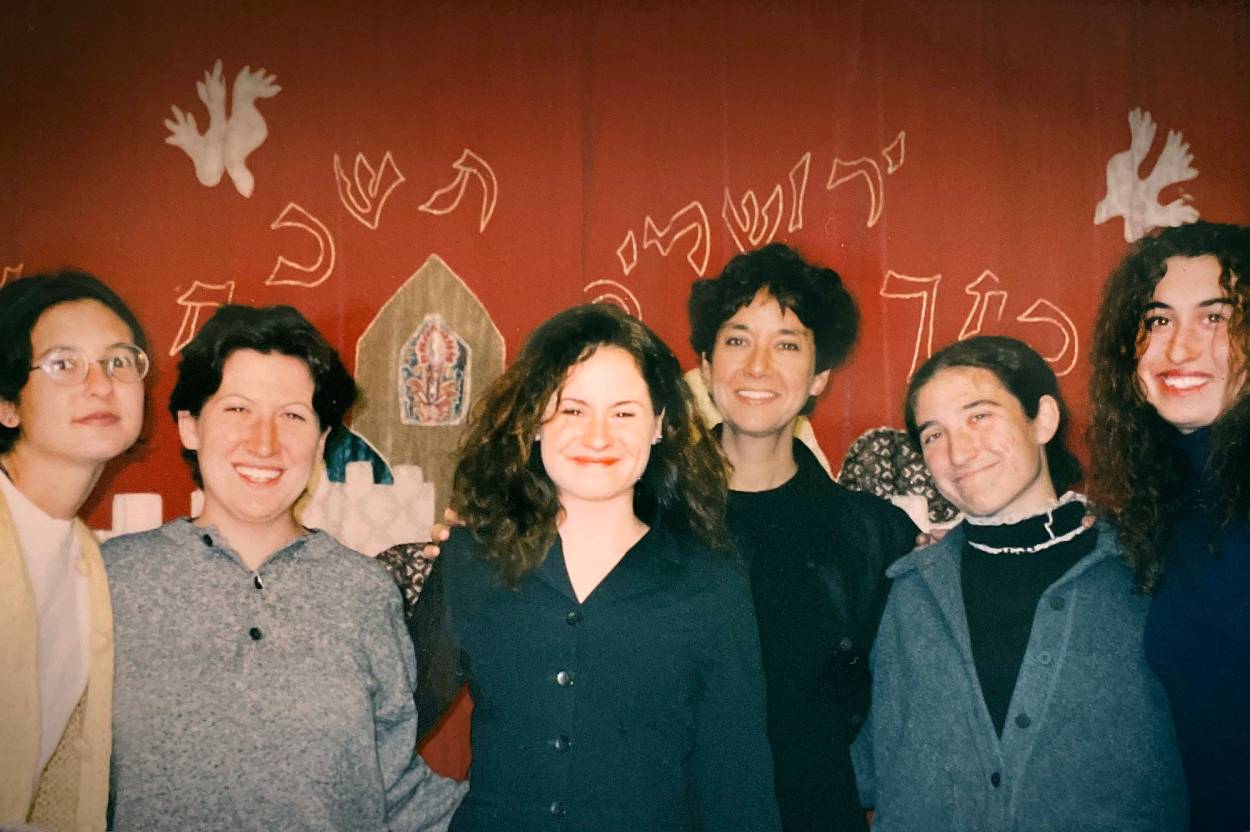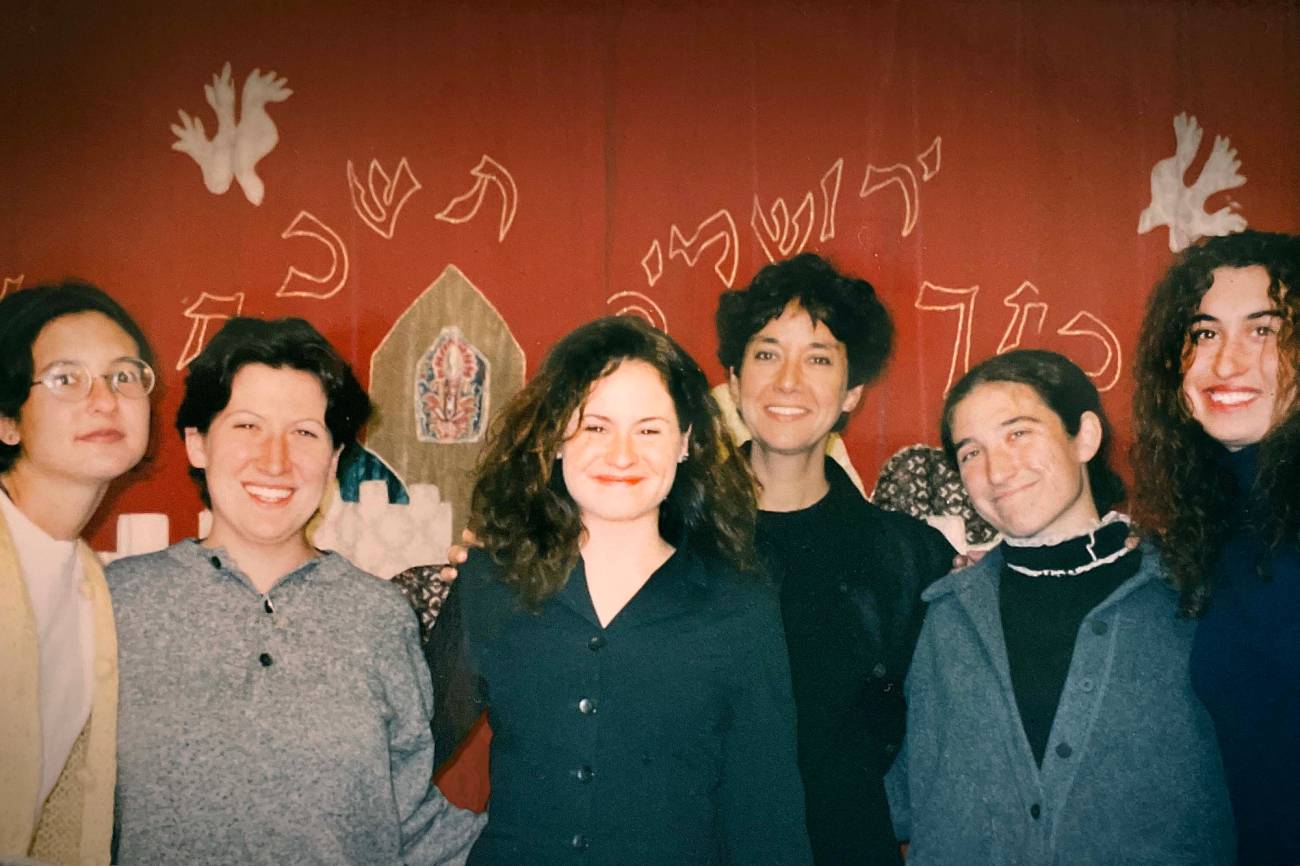The Right Time for a Bat Mitzvah
Why I waited to have a ceremony as an adult—when I was ready to embrace my Jewish identity on my own terms




On a cool November morning in Jerusalem in 1996, the rabbi called me to the bimah by my Hebrew name. I stood next to him, wearing a simple black suit jacket paired with a long flowing floral skirt. Though he had the English transliteration of the Hebrew prayers ready in case I needed it for my aliyah, I sang the call and response I had memorized by heart, tears shining in my eyes. Looking out at the congregation, I saw my friends watching me proudly. After the service finished, the rabbi asked them to join me and took our picture.
This was not a typical bat mitzvah. My parents were missing that day, along with my siblings and all the people I’d grown up with in Chicago. There was no lavish party afterward; the ceremony was celebrated with tea and scones at a nearby restaurant. There was no dancing, no cover band, only the quiet joy and satisfaction I felt inside. And I wasn’t 12 or 13—the typical age of most bat mitzvah girls. I was 20.
That day I commemorated my renewed connection to my heritage, one that had gone missing in my adolescence. I had found my way back to Judaism, embracing it on my own terms and in my own time.
I have early memories of running down the halls at our large Reform temple on the south side of Chicago, KAM Isaiah Israel, when I was growing up in the 1980s. At age 6, I loved going to Sunday school and hearing biblical stories about Abraham, Isaac, and my namesake, Sarah, the first Jewish woman. My father taught me to recite the Shema as he tucked me into bed in the apartment he rented after he separated from my mother.
We left that congregation when my father remarried, and he and my stepmother moved to the suburbs. When I was 9, they had their first child together, my adorable sister Mindy. There was something wrong, though. Her development was delayed, and she never learned to sit, or crawl. Toward the end of her first year of life she was diagnosed with Tay-Sachs.
It was impossible at the age of 10 to process that she was going to grow sicker and die. My childhood had been turbulent enough with my parents’ divorce. Why did G-d have to take away the only good thing that had arisen from it? It was hard to believe in any deity who could take life away from a beautiful, innocent child. My blood boiled with anger during the holiday services intended to honor what I considered an unjust G-d. I decided not to believe in Him at all.
At that time my parents lived four hours apart from each other. The responsibility of my religious education fell to my mother because I had to attend Hebrew school during the week; I missed Sunday school when I visited my father every other weekend. The teachers complained about my inconsistent attendance, and said I was missing half of the information. They were right. I felt left out and started to notice that the other children knew the songs during services, but I didn’t. I was always behind, and this increased my angst.
My awkward adolescence didn’t help matters. I had a short haircut, large glasses, and braces. One day the substitute teacher at Hebrew school confused me for a boy, and that was the last straw. “Young man, quiet down!” she repeated. I looked around the room to see who she was talking to. When I realized that she was addressing me, my face turned crimson. She apologized when another student corrected her, but it was too late. I swore I would never go back.
It was a relief to give up my religious education. My parents didn’t protest my decision or ask me to reconsider—perhaps they were relieved as well. I told myself that having a bat mitzvah wasn’t the right path for me; they continued to argue long after their divorce, and I couldn’t imagine sharing a bimah or planning a party with them.
My father and stepmother had another child, a healthy boy. The joy of watching my brother grow could not make up for the helplessness I felt witnessing my sister’s decline. She lost the ability to see and hear, and her poor body was racked with seizures. Mindy died at age 3, two weeks after my 13th birthday. When other Jewish girls were having their bat mitzvahs, I was attending my sister’s funeral.
That fall I started eighth grade in a new school, in a new suburb, after my mother married my stepfather and we moved yet again. I was removed from the friends who knew about the loss I was suffering, and I didn’t share my grief with the new friends I made. I thought that I could start over and that her death wouldn’t affect me, but I was wrong. In high school my grades dropped. I left college after one semester.
I had stopped attending services, and other than celebrating the holidays with my family, I didn’t spend much time pondering my religious identity. My stepmother—who had attended a socialist-Zionist Habonim summer camp, and had volunteered on a kibbutz in the ’70s—took me to a Chicago memorial service for assassinated Israeli Prime Minister Yitzhak Rabin in 1995. I was touched by the outpouring of grief for the man who was killed for his efforts to create peace for a Jewish country that I had heard so much about but had never seen.
I decided to travel to Israel the following year. Attending a program named Project Oren, I lived on Kibbutz Ramat Rachel, located just outside Jerusalem, for four months. I divided my time between ulpan (Hebrew classes) and working. Some days I chopped tomatoes and cucumbers in the chadar ochel (cafeteria), and others I picked apples and mopped floors.
I was surprised that despite my previous aversion to Hebrew school, I loved learning Hebrew in the mandatory ulpan classes I attended on the kibbutz. I preferred it to the American way I had been taught to read, but not understand, what was written in prayer books. Learning conversational Hebrew became a functional way to navigate signs at the grocery store or to talk to a bus driver.
I sensed that I was connected to a golden thread that was larger than me, and that my existence served a small, yet significant purpose. I had a meaningful role to play.
I discovered that Judaism was defined differently by Israelis. Most of the Jews I met on kibbutz didn’t go to synagogue, and many of them were agnostic. They were Jewish in essence, meaning that their Judaism was interwoven into the fabric of their day-to-day lives. I realized that I didn’t need to believe in G-d to enjoy being Jewish, and I didn’t need to feel guilty about it.
I loved being part of the buzz at Machane Yehuda market as people hustled on Friday mornings to purchase food for Shabbat. I spent hours walking the narrow cobblestone corridors of the Old City. Observing and becoming part of the rhythm of my people, I learned to inhabit my Jewish identity. I took up running and found peace in the sounds of my feet hitting the pavement, and the mix tape tunes I played on my Walkman. From the back of the kibbutz, there was a vantage point where I could gaze out over the hills that were once battlefields. In this magical place, I could innately feel the connection to my heritage beyond present time and space. I sensed that I was connected to a golden thread that was larger than me, and that my existence served a small, yet significant purpose. I had a meaningful role to play. But it wasn’t enough for me to immerse myself in it. I desired an outward expression of my commitment to Judaism.
I wanted a ceremony. I wanted, at age 20, a bat mitzvah.
My roommate found a lone Reform synagogue in Jerusalem and took me to services. The rabbi knew I was returning to the States and didn’t have time to learn a Torah portion, but said it didn’t matter. The only thing required to become bat mitzvah was to recite an aliyah.
Having a bat mitzvah at the age of 20 felt right to me. It wasn’t about a relationship with a deity, but about actively taking my place among my ancestors and celebrating my lineage. Before that, I had felt that a bat mitzvah was a commitment to G-d and religious education, but after living in Israel, I felt that the ceremony was a personal commitment to honoring the tenets of Judaism that were important to me as an individual, instead of conforming to standards that were expected of me.
After living in Israel, I returned to college and studied Middle Eastern politics and minored in Jewish studies. I spent my junior year abroad at Tel Aviv University. For a short time, I even taught Sunday school. Five years after leaving the kibbutz, I married my husband, also an agnostic Jew. In keeping with our intention to lead a culturally Jewish yet secular life, we asked a Humanistic guide (called a madricha) to lead our wedding ceremony. I loved the signing of our simple ketubah, which still hangs in our bedroom, and the role our family members had in the blessings over the challah and wine. Our wedding day symbolized both our values and the home we wanted to create together.
Judaism is an important aspect of our family identity today. Our sons had brises and attended Jewish preschool. We do not attend shul on the High Holidays, but we go to the beach and perform tashlich, symbolically tossing bread in the water, casting away our regrets as we discuss our intentions for the new year. We have traveled with our sons to Israel, and they enjoy celebrating the Jewish holidays with our large extended family. But when it came to deciding to have bar mitzvahs at the age of 13, we gave them a choice—and it will likely not surprise you that they opted out. They had heard their peers complain about the studying involved, and they were not interested. I respect their views and am glad that they are doing what feels right for them.
A bar mitzvah is an important rite of passage, and a lovely tradition, but it takes more than that to be a Jew. It’s a choice one makes, again and again and can be reflected in many aspects of life. My Jewish identity has helped me when I have needed it, but it doesn’t demand servitude in return. And it’s that lack of obligation that makes me turn to it again and again.
My sons are now in college and high school. The eldest has pledged a Jewish fraternity and is obsessed with perfecting his brisket recipe. At times I wonder if he or his brother will ever reconsider their decisions to forgo a bar mitzvah. Nobody knows better than I do that you can change your mind about what’s meaningful to you about being Jewish. And if they want to have a bar mitzvah when they’re 20, or 30, or 40, it’s never too late.
Sarah Leibov is a Chicago-based writer at work on a memoir.